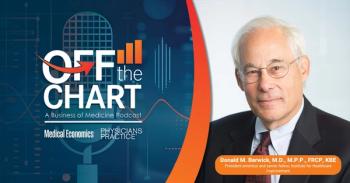
The healthcare industry is in desperate need of healing
In the transition from volume to value, there are three keys to keep in mind to make things beneficial for physicians and patients.
Nearly every industry in the United States has become part of the on-demand economy, where consumers can get what they want, when they want it, and sometimes before they even realize they want it. Media, banking, grocery shopping-just about everyone has had to adapt to the Amazon effect.
Healthcare is slowly being pulled into this vortex of convenience and effectiveness. Within the last year, 71 percent of all medical practices have reported making changes to reduce patient wait times, according to a
But it is not nearly enough. We are not close to getting the outcomes we say we want: better care and more satisfied patients at lower costs.
I know healthcare is a notoriously complex system with costs nearing
The frontline players-patients and physicians-will have to be bigger drivers of the change we need. Patients are going to have to demand more and doctors are going to have to deliver more on outcomes and accept that part of their compensation is going to be tied to that.
In fact, I would suggest that physicians build their data analysis and communication skills to articulate what measures and metrics actually do promote better health and better outcomes, long before those benchmarks are set for us. After all, big tech, payers, and investors are perhaps more incentivized than we are to manage costs. Healthcare is a big, juicy market to “disrupt.”
Here’s what the industry needs to keep in mind through this transition:
Focus on outcomes
In the search for quality, are physicians asking the right questions? We stuff our EHRs with data, but is it the right information and is it being used to the greatest effect? Data does not inevitably create discernment.
We need to reverse engineer the process. Let’s start with the desired end result and work backward from there to build processes and compensation models that reinforce the desired outcome, rather than what we’re doing now. My fear is that we’re waiting for someone else to do it for us. Or, perhaps more accurately, to us.
According to a 2016 MGMA
Even as there is this disconnect, physicians are asked to manage too many metrics-4,000 data points at our last count, which doctors are forced to enter manually into EHRs after each appointment. Yet, we haven’t stepped back to ask whether or not these metrics are actually helping us to deliver the outcomes we want. I believe doctors want to influence clinical outcomes, but that’s hard to do when spending twice as much time on paperwork than with patients.
When organizations create compensation plans that base 5 percent or 10 percent of physician payments on myriad metrics that might not be ultimately relevant to patient health, the entire process becomes top heavy and difficult to manage. Of course, business people want to build compensation plans around what can be measured, but as physicians, we need to call for a focus on the measures that truly indicate patient health as our true yardstick of success.
There is no single solution
Every insurer, every physician, and every patient has their own idea about what constitutes quality. That’s OK to an extent, as the definition will and should vary. It’s not neat, but we have to accept that this will be the case and move forward from there.
Adding more quality markers won’t help, but that doesn’t necessarily mean that removing the ones we don’t agree with either. We must enable physicians to determine for themselves what quality looks like, stop spending time and money trying to define it with too much granularity, and instead focus on what can be done with the available tools.
To achieve mass customization in healthcare, we must accept fluidity and flexibility. Compensation plans will be a dynamic blend of base pay, production, and then enhanced compensation or a bonus tied to achieving certain patient outcomes that are unique to each organization’s and individual’s need.
And that’s where metrics come in. Once those outcomes are determined, doctors should work within their systems to discern what measurable metrics truly indicate how they are delivering on those outcomes compared with other physicians.
Build a better model
As much as we hear about the move from quality to value in healthcare, we are still a fee-for-service compensation industry (with a few exceptions). There are lot of different players making a lot of money with the current system, and it’s all based on the same productivity model of compensation. The more patients you see, the more money you make.
It’s the model we have, whatever we might think of it, and it’s not going anywhere anytime soon. But we cannot rest on our fee-for-service laurels. We can begin by using the tools at our disposal to accelerate change.
We know that healthcare can’t be run on algorithms. Health technology is not going to save us, although it can fill in much-needed gaps. The human element is essential to achieving better patient outcomes. We have to think our way out of this, putting the patient at the center of our efforts, not the technology.
When you’re sick and vulnerable, you want the intimacy of human interaction, and that is impossible to reproduce with digital tools. Our compensation models need to reinforce this. Better care with better satisfied patients at lower costs can be achieved if we put patients first and incentivize our doctors-and frankly the rest of the system-to make those outcomes paramount.
Halee Fischer-Wright, MD, is a healthcare leader, physician, speaker, author, and president and CEO of
Newsletter
Optimize your practice with the Physicians Practice newsletter, offering management pearls, leadership tips, and business strategies tailored for practice administrators and physicians of any specialty.






